Slippery Reality

Slippery Reality
Leah Regester
On Psychosis and the Everlasting River
The week after my fifteenth birthday, the air cooled quickly. It was unusual how fall followed on the heels of August that year, how the gray mist outside lent us confidence in summer’s passing. I watched it through the wire-webbed glass of my window. Hugged a jacket around my shoulders as I paced through the wilted courtyard. Cranked up my thermostat to eighty-four — partially to create an oasis of comfort, partially to annoy the staff, who sighed with exasperation every time they opened my door. Sustainability be damned, I hoped childishly to affect the energy bill.
There was a tree outside my window, and a bench. I would stare at the tree, telling myself I could see its leaves growing darker by the day, and imagine sitting next to it, how nice it would be. On my discharge date, after the heavyset male nurse tore my friend away from me so forcefully that he bruised her arm, I marched outside and seated myself on the bench. It was not nice. It was cold, and I did not feel half as free as I had expected to. I climbed into my mother’s car and we left.
The paperwork that had been bestowed upon my mother contained a new phrase: schizoaffective disorder. I could not deny being affectively disturbed, but I resented the prefix. Years later, when I saw the diagnosis still listed on my chart at my pediatrician’s office, I demanded that it be removed. Whether it was or not, I don’t know. I never went back.
In the hospital, my roommate’s father and stepmother visited her once over lunch. She was nervous. Her father, I gathered, was not a kind man. In the cafeteria, I noticed him glancing over his daughter’s shoulder at me. I raised my eyebrows. Tightened my jaw. Imagined myself as a wild animal, teeth bared and snapping. Later, she told me her father had been unnerved by my presence.
“I told him you’re my friend and you’re, like, psychotic,” she said. “I think he was scared of you. He was nicer to me than usual ‘cause he thought you were staring at him.” “Oh, I was,” I assured her.
It was a source of smug relief then. If you know me, you will be scared. And if you are scared, you will run, and I will be safe. At least temporarily, I could guard my friend against her father’s harshness. I could be a shield, though the threat of transforming into a weapon remained distant. Could I ever go on the offensive? I never had and suspected I never would. Violence against others did not seem possible to me, although there were times — in anger and in desperation — when it seemed desirable. I never did become the weapon, not in that sense, but I relished the power I could hold simply through others’ belief in the possibility of it.
My early twenties passed as a fever dream, sharp and sweet and undeniable. The story of God eclipsed mine half a decade after that hospital admission. The people of God welcomed me into their number. The Word of God dwelt richly among us.
*
Seven months into my new life, I stopped taking my antipsychotics. I had not been psychotic in two years, I lived a remarkably functional life, and my dose was low. My diagnosis of schizoaffective disorder had been up for debate by other clinicians since the month after it was issued. I disavowed it fully in adulthood, although I could not reverse the ways my adolescence had been shaped by psychosis and alienation. My therapist, who knew both me and psychology well enough to make such a claim, agreed that I had never been schizophrenic. Nevertheless, I was unable to suppress tears in the psychiatrist’s office when she advised me against discontinuing the medication.
“You’ve had some really scary things happen,” she said kindly, passing me a tissue box over her desk. “I wouldn’t recommend going off the medication that’s probably keeping you stable. I can tell you’re scared by that, too.”
I wasn’t, although I didn’t bother to explain my tears. I was primarily distressed by the idea that I, in my unaltered state, was a thing to be scared of, and that, if I remained medicated, I could neither confirm nor disconfirm this theory. A thing to be scared of was not a thing to love. A thing one should potentially be scared of was not a thing to love.
I did not take the psychiatrist’s advice. Much to my satisfaction, I did not rapidly decompensate. Reality took on the quality of mud — often relatively firm beneath my feet, sometimes slippery and pitted with sinkholes. Though it was more pliable than it might have been for others, it was solid enough, enough of the time, to hold me.
When it was not, I retreated to my room; isolation appeared to be my least ominous option, though it was terrifying in its own way. I stared out my windows at the park across the street, where decaying leaves still carpeted the ground, the trees having long since shed their clothing. Their skeletal shapes frightened me. I worried for the sky, which seemed in danger of being sliced open by the sharp bare branches.
In my confusion and fear, I interacted minimally with others, not even wanting to speak to my roommate. I knew I had disclosed personal information to her before without negative consequence, but it seemed impossible to rehearse a list of such instances. Had I been able to do so, I might have felt more confident in my ability to tell her how my mind was burning. Or I might not. It was too hard to know. Later, when the connective and causative properties of reality began to re-solidify, I would tell her, haltingly and with sparse details, what was wrong. She would listen quietly, her face lined with sober care. I could not tell if there was curiosity in it. I could not tell if there was fear. What I had once spun into a perverse source of power had become the thing that separated me from everyone, always: If you know me, you will be scared. And if you are scared, you will run, and I will be alone.
If you know me. In the days and weeks when reality slipped, I would endeavor not to be known. It was not possible, I theorized, to know me—it would somehow entail destruction. It would result in more chaos than anyone could bear. I could not bear it myself, which was why I had ceased to exist; there was nothing anymore to know of me, only a vast expanse of Things which could not be controlled, which might swell and crash without notice.
*
Chaos is wrapped up in the waves of that biblical metaphor for untamed might and, alternatively, restoration. The waters that dislodge life might also revive it.
In the beginning, there had been water and darkness. Before God spoke light and heavens and earth into existence, his Spirit kept watch over a formless realm. As he set order to the void, he put limits to the sea. He carved rivers into the earth. Without these rivers’ nourishment, without the showers of rain he brought upon the land, there would be no plants. No life. The waters, within their bounds, were indispensable.
Yet when God was grieved by the desecration of his world, it was water that he used to wipe it clean. He opened the heavens and poured out rain. It was water that prevailed upon the earth, floods of destruction, and nothing was left but the ark of one righteous man and his family, bobbing, protected, above submerged mountaintops. And when the waters receded, the man on the ark became a farmer. I imagine, like most farmers, he prayed for rain at times. I imagine he might still have felt fear at the sight of it. Under misty skies, he must have looked up and remembered the promise.
“When I bring clouds over the earth and the bow is seen in the clouds,” God had said, “I will remember my covenant that is between me and you and every living creature of all flesh. And the waters shall never again become a flood to destroy all flesh. When the bow is in the clouds, I will see it and remember the everlasting covenant between God and every living creature of all flesh that is on the earth.”
I would lay my hands out in front of me, examine the white seams and wrinkles of my right forearm. Was it disfigured, or was this simply its figure? I was a living creature of flesh. I knew this because he had knit me together once, and he had done so over and over again as I tried to undo his work. I was party to this covenant, then — that the waters of chaos would never again become a flood to destroy us.
Did God owe me a mind that performed as I wanted? Did I do well to rage against him for withholding this from me? I did not believe so. Yet to consign myself to this — to not badger him on behalf of my sanity, to submit to a placid resignation that he must simply not will my wellness and that his will must come above my own — would have left me in resentful silence before him. What did God owe me? Nothing. What had God given me in Christ? Everything. What did that grace mean to me now?
During the weeks of disintegration, no original prayer left my lips. I could not corral any words from my own heart to offer to the Lord of lords. Did my own heart, my own mind, still exist? If so, perhaps they existed elsewhere, awaiting a miraculous return to me.
I knew they would not be fractured forever. I had memorized Psalm 23 during a previous slippery season, and when I could summon up no words of my own, I would recite it before falling asleep. He leads me beside still waters. He restores my soul. I knew little else, but I knew this: there would be a river like crystal, and its banks would burst with trees whose leaves would never darken and die. These trees would shine with life, and when I sat at last beneath their canopies, no disappointment or fear would meet me. Their fruit would be food for me. Their leaves would heal me. And I would not be alone anymore, and we would be safe, every one of us, and there would no longer be any lack of love. The fruit of the trees by the river would be food for all of us, and their everlasting leaves, our healing.
Leah Regester
Writer & Student
Leah is a Massachusetts-based student and church plant member. She is pursuing a graduate degree in clinical mental health counseling and writes poetry and prose in an effort to illuminate the unseen. She believes that the light shines in the darkness and the darkness has not overcome it.
Photography by Beyzaa Yurtkuran





